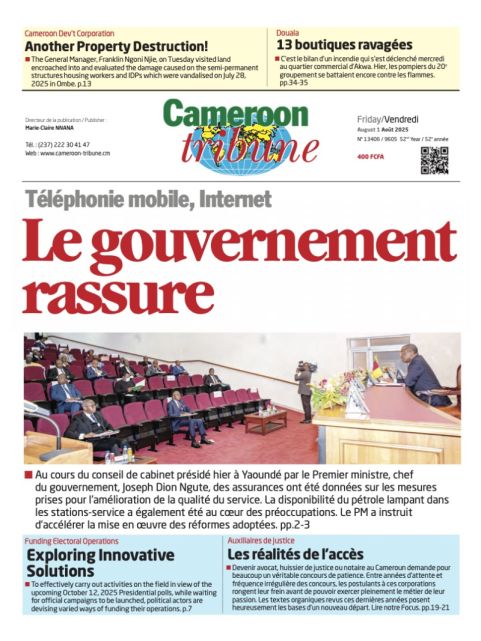Local Dev’t: The Lukewarm Decentralisation!
- Par Godlove BAINKONG
- 05 févr. 2024 12:23
- 0 Likes
All things being equal, Cameroonians of voting age who have or will enrol their names on the voters list will next year be convened to the polls to choose their leaders from the country’s highest authority to grassroots leaders. Going by the existing electoral code, Presidential, Regional, Legislative and Municipal elections are due in 2025. These will be inclusive elections with very high stakes! It promises to be electrifying and expectations are very rife.
The election euphoria is growing by the day as aspiring candidates and political parties hoping to compete are already devising strategies of standing taller at the end of the polls. They are therefore laying the groundwork for electoral campaigns which usually take many forms depending on the candidate, the political party and even the nature of the electorate. The bottom line is to convince the electorate to vote for this or that candidate or party when the moment comes. Besides simply sweet-talking the electorate, which is a common political game in any democracy, aspirants will equally be showing off what they have done or are doing which they judge better than those of their opponents. Those holding elective positions would want to conserve their posts while newcomers would desire to taste the sweetness of power. The electoral manoeuvres are on! Logical in a multi-cultural nation like Cameroon.
This is where the task will be challenging to most, if not all, grassroots leaders. If the choice of candidates is made solely on the basis of achievements, then Regional Assemblies and Councils would need to go an extra mile to convince any keen elector. Without carrying out any scientific survey, it is obvious that a good number of what they drafted and presented as Regional and Communal Development Plans, on which most of them were voted into office, have largely remained on paper. The roads, water, electricity, schools, health units and other life-changing projects they envisaged are far from being a reality. Their execution is still highly awaited by the beneficiaries even as another moment of promises approaches. Difficult to say with precision the magic they would employ to do in the few months what they have been unable to achieve in the past four years. What balance sheet will they therefore present?
As the answer blows in the wind, it is however important to underline that these local authorities cannot carry the blame of the somewhat years of lacklustre development alone. Some of them had the goodwill to transform their localities and almost all of the elected officials lacked the sufficient means to materialise their visions to tangible development. The flow of financial resources from the central administration to the decentralised bodies has not been fluid. Decentralisation entails the putting in place of legal and administrative instruments, setting up specialised structures as well as transferring competences and financial resources to drive home the much-needed local development. It has been said time and again that the transfer of powers goes with the transfer of material, financial and human resources.
Inasmuch as quality human resources appear to be a central factor in the performance of the Regional and Local Authorities, it must be underlined that they would not attain any objective if adequate financial resources are not made available and on time. It is true that personnel need salaries as the central government has been working to ensure that Regional Assemblies, for instance, get the FCFA 3 billion annually. The money is mostly for the day-to-day running of the decentralised bodies. Worrying how a process which could have been a real asset to local development through people-driven projects is almost reduced to a liability on the State and its scarce resources. Whereas, consistent and constant funding would have been vital for the execution of already rationally selected widespread projects which have the predisposition to develop the local areas; the raison d’être of the existence of these decentralised structures.
Taking one and leaving the other at best breeds failure! Regrettable, this seems to have been the conscious or unconscious choice of some public authorities who appear so envious of the self-centred sovereignty. If not, what explains the lukewarm decentralisation process in the country, a local development tool acclaimed by the Head of State in several public speeches?
Underlining his conviction that, “Our fellow citizens’ desire greater participation in managing their affairs, especially at the local level,” tells of the Head of State’s desire to tackle the decentralisation challenges head-on. It was therefore obvious that on December 31, 2017, Mr. Biya made it abundantly clear that, “It is my firm belief that fast-tracking our decentralisation process will enhance the development of our Regions. To that e...
Cet article complet est réservé aux abonnés
Déjà abonné ? Identifiez-vous >
Accédez en illimité à Cameroon Tribune Digital à partir de 26250 FCFA
Je M'abonne1 minute suffit pour vous abonner à Cameroon Tribune Digital !
- Votre numéro spécial cameroon-tribune en version numérique
- Des encarts
- Des appels d'offres exclusives
- D'avant-première (accès 24h avant la publication)
- Des éditions consultables sur tous supports (smartphone, tablettes, PC)











Commentaires